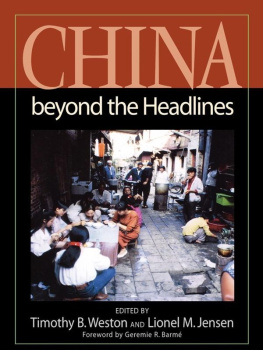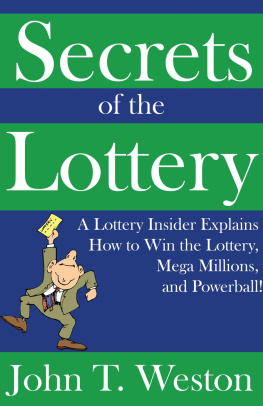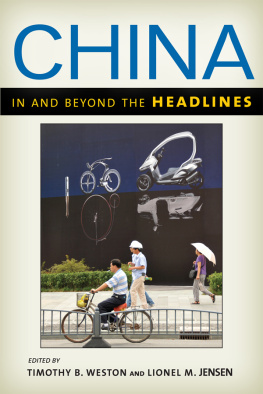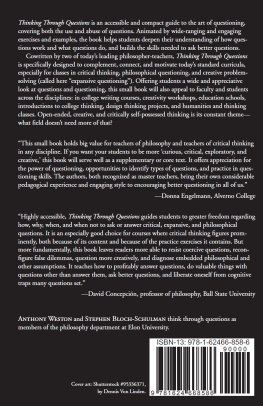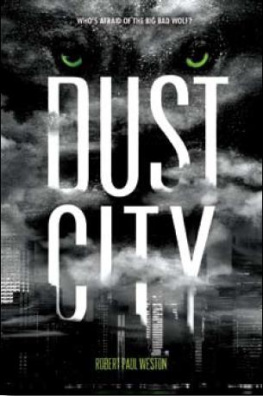Weston - China beyond the Headlines
Here you can read online Weston - China beyond the Headlines full text of the book (entire story) in english for free. Download pdf and epub, get meaning, cover and reviews about this ebook. year: 2000, publisher: Rowman & Littlefield Publishers, genre: Politics. Description of the work, (preface) as well as reviews are available. Best literature library LitArk.com created for fans of good reading and offers a wide selection of genres:
Romance novel
Science fiction
Adventure
Detective
Science
History
Home and family
Prose
Art
Politics
Computer
Non-fiction
Religion
Business
Children
Humor
Choose a favorite category and find really read worthwhile books. Enjoy immersion in the world of imagination, feel the emotions of the characters or learn something new for yourself, make an fascinating discovery.
China beyond the Headlines: summary, description and annotation
We offer to read an annotation, description, summary or preface (depends on what the author of the book "China beyond the Headlines" wrote himself). If you haven't found the necessary information about the book — write in the comments, we will try to find it.
Weston: author's other books
Who wrote China beyond the Headlines? Find out the surname, the name of the author of the book and a list of all author's works by series.
China beyond the Headlines — read online for free the complete book (whole text) full work
Below is the text of the book, divided by pages. System saving the place of the last page read, allows you to conveniently read the book "China beyond the Headlines" online for free, without having to search again every time where you left off. Put a bookmark, and you can go to the page where you finished reading at any time.
Font size:
Interval:
Bookmark:
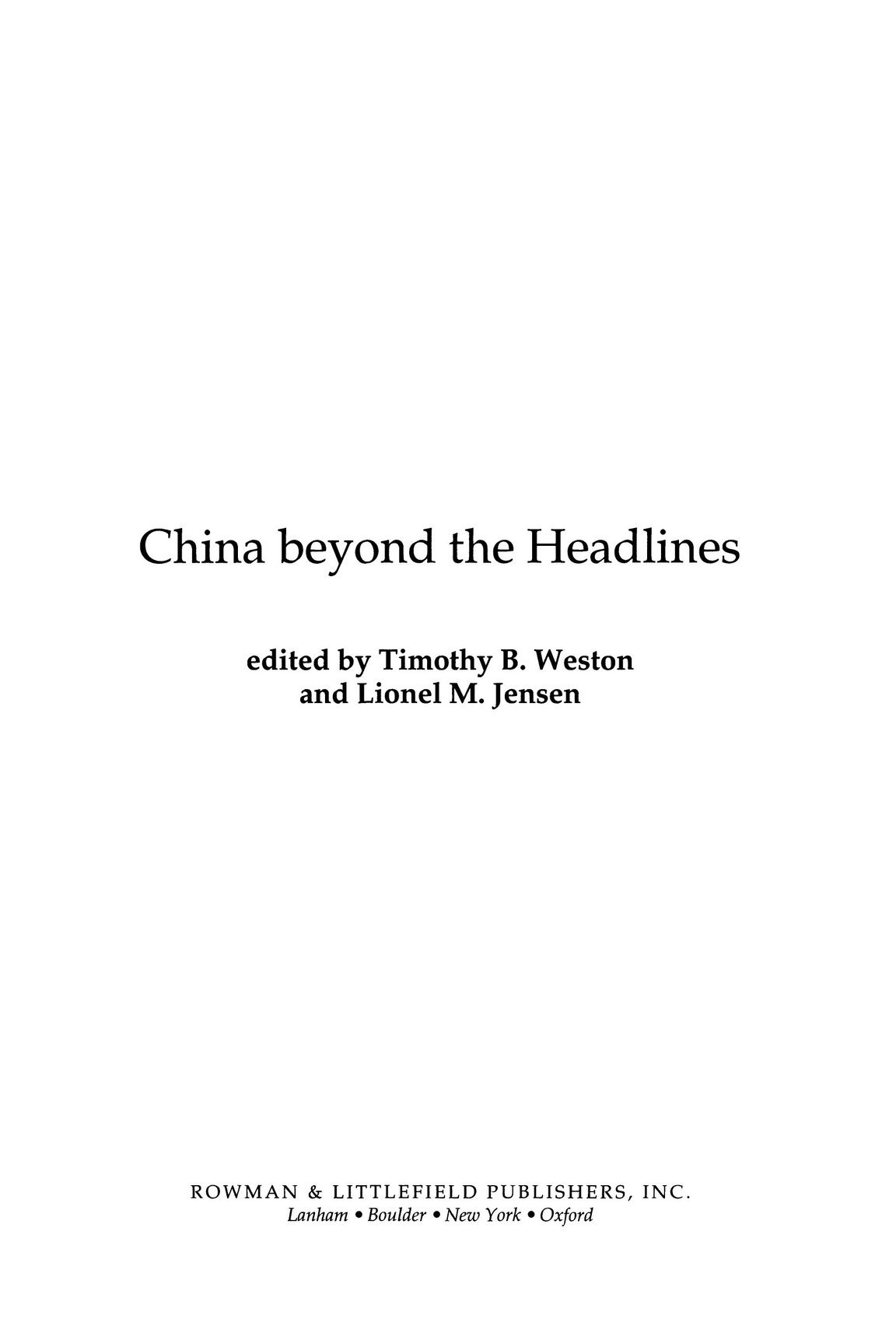
ROWMAN & LITTLEFIELD PUBLISHERS, INC.
Published in the United States of America
by Rowman & Littlefield Publishers, Inc.
4720 Boston Way, Lanham, Maryland 20706
http://www.rowmanlittlefield.com
12 Hids Copse Road
Cumnor Hill, Oxford OX2 9JJ, England
Copyright 2000 by Rowman & Littlefield Publishers, Inc.
All rights reserved . No part of this publication may be reproduced, stored in a retrieval system, or transmitted in any form or by any means, electronic, mechanical, photocopying, recording, or otherwise, without the prior permission of the publisher.
British Library Cataloguing in Publication Information Available
Library of Congress Cataloging-in-Publication Data
China beyond the headlines / edited by Timothy B. Weston and Lionel M.
Jensen.
p. cm.
Papers presented at a symposium at the University of Colorado in 1997; many of them revised.
Includes bibliographical references and index.
9780742573116
1. ChinaSocial conditions19762. ChinaEconomic conditions19763. ChinaRelationsUnited States 4. United StatesRelationsChina. I. Weston, Timothy B., 1964II. Jensen, Lionel M. ISBN: 978-0-8476-9855-4
HN733.5.C4285 2000
306.0951dc21
99-050294
Printed in the United States of America
 The paper used in this publication meets the minimum requirements of American National Standard for Information SciencesPermanence of Paper for Printed Library Materials, ANSI Z39.48-1992.
The paper used in this publication meets the minimum requirements of American National Standard for Information SciencesPermanence of Paper for Printed Library Materials, ANSI Z39.48-1992.
I dedicate this volume to my parents, Burns H. Weston and Hanna B. Weston. Their interests and concerns have fired my own.
T. B. W.
For the laboring peoples of China and the United States with the earnest hope that in their daily industry they will work free of the national stereotypes that limit prospects for ecumenism.
L. M. J.
| 1898 | 100 Days Reform Movement |
| 1911 | Xinhai Revolutionthe collapse of the Qing dynasty and the founding of the Republic of China |
| 1912 | Founding of the Nationalist Party (Guomindang/Kuomintang) |
| 1921 | Founding of the Chinese Communist Party |
| 194549 | Chinese Civil War (Communists versus Nationalists) |
| 1949 | Communist RevolutionMao Zedong (18931976) becomes the leader of China; founding of the Peoples Republic of China (PRC) |
| Nationalist Party retreats to Taiwan, reestablishing the Republic of China | |
| 196676 | Great Proletarian Cultural Revolution |
| 1975 | Four Modernizations are proclaimed |
| 1976 | Mao Zedong dies |
| 1978 | Deng Xiaoping (19041997) becomes paramount leader; beginning of the Four Modernizations (agriculture, industry, science and technology, national defense) |
| 197879 | The Democracy Wall Movement |
| Wei Jingshengs The Fifth ModernizationDemocracy | |
| 1979 | Normalization of PRCU.S. relations |
| Formation of Special Economic Zones (SEZs) | |
| 1981 | Socialism with Chinese Characteristics is officially proclaimed the national goal |
| 1989 | Tiananmen Democracy protests; June 4th Massacre |
| 1992 | Deng Xiaopings Southern Tourreaffirms commitment to capitalism |
| 1997 | Deng Xiaoping diesJiang Zemin becomes president |
| Return of Hong Kong | |
| President Jiang Zemin pays state visit to the United States | |
| Collapse of Asian financial markets | |
| 1998 | President Bill Clinton pays state visit to China |
| 1999 | Premier Zhu Rongji pays state visit to the United States |
| NATO destroys Chinese embassy in Belgrade | |
| Chinese protesters attack U.S. embassy in Beijing and ignite the U.S. consulate in Chengdu | |
| U.S. Congressional Report reveals Chinese theft of U.S. nuclear secrets | |
| China celebrates the Fiftieth Anniversary of the Founding of the Peoples Republic | |
| Portuguese entrept of Macao returned to Chinese sovereignty | |
| 2000 | Original projected date for the realization of the Four Modernizations (revised in 1994 to 2047) |
| Renminbi (rmb): lit. peoples money, national currency of China | |
| 8.24 Chinese Dollars ( yuan , ) = 1 U.S. Dollar | |
| 7.77 Hong Kong Dollars = 1 U.S. Dollar | |
| centimeter (cm): | .39 inch |
| gram (g): | .035 ounce |
| Gigatonne (Gt): | one billion metric tons |
| hectare (ha): | 2.47 acres |
| kilogram (kg): | 2.2 pounds |
| square kilometer (km2): | .38 square mile |
| megatonne (Mt): | million metric tons |
| meter (m): | 3.28 feet |
| square meter (m2): | 10.76 square feet |
| cubic meter (m3): | 35.31 cubic feet |
| microgram (): | 1/1,000,000 gram |
| milligram (mg): | 1/1,000 gram, .015 grains |
| millimeter (mm): | 1/1,000 meter, .1 cm |
| mu | .667 acre |
| tonne (metric ton, t): | 1,000 kg; 2,205 pounds |
Geremie R. Barm
T heres a school of thought that argues that China is a story just waiting to happen. The headlines have been written, the outcome preordained. The only thing thats missing is copy from the frontlines of the breaking media event, information that will fill in the fine detail, add a touch of local color here, a dab of poignancy there. For any marketable description of the endgame requires a dimension of personal tragedy and a measure of bathos that makes any good story just that.
All too often in the West, particularly in the United States, China doesnt seem to have much of a chance; it barely even has a present. But it does have a future. If you restrict your media consumption to glib sound bites and headline one-liners, its a future that is the past of the Soviet Union or could just as well be the past of a swath of Eastern European nations. Its supposed to be the future of all the defunct autocratic one-party police states that held sway during the twentieth century.
Chinas tomorrow is, as they say, its yesterday. Or, as the Russian philosopher Mikhail Epstein put it when considering the denouement of the Soviet empire: The communist future had become a thing of the past, while the feudal and bourgeois past approaches us from the direction where we had expected to meet the future.
Caught between the dire historical fate of European totalitarianisms and the seemingly impossible future of Chinese socialism and communism, the present itself disappears, or at best becomes a stopgap diversion that keeps the progress of history on hold. The headlines from that frontline are about a story waiting to be told. Epstein calls this particular condition postfuturism, insofar as it is not the present that turns out to be behind us, but the future itself.
In the 1980s and 1990s popular characterizations of mainland China readily invoked a grand narrative that told a story about that last bastion of recalcitrant one-party rule being undermined by economic reforms and the liberating pressures of technology, social change, and global markets. It was a view that presented us with an inexorable logic: market diversity will result in increased commercialization; the growth and strengthening of new social forces as well as of a general liberalization will in turn engender political, social, and cultural pluralism. While it is all too common to encounter Chinese thinkers and writers who gloat to Western analysts and observers that China and its politics are simply too complex ( tai fuza ) and beyond the ken of outsiders to truly understand, Western masters of whither China scenarios are equally confident in their privileged knowledge about the globalized future of the world. For their part they argue that everything is really very simple ( hen jiandan ). They reason that the mainland will inevitably go the way of Taiwan and sooner or later become a pluralistic market democracy. Their confidence is based on a linear view of historical change; they believe theyve seen the future, and they claim it works, at least for them.
Font size:
Interval:
Bookmark:
Similar books «China beyond the Headlines»
Look at similar books to China beyond the Headlines. We have selected literature similar in name and meaning in the hope of providing readers with more options to find new, interesting, not yet read works.
Discussion, reviews of the book China beyond the Headlines and just readers' own opinions. Leave your comments, write what you think about the work, its meaning or the main characters. Specify what exactly you liked and what you didn't like, and why you think so.

